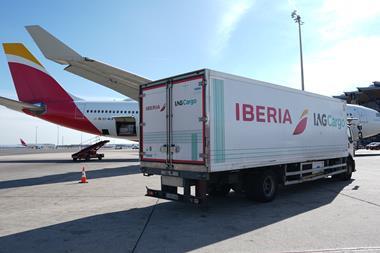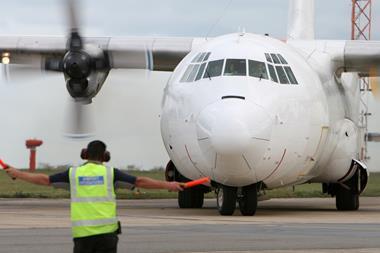The vertiginous rise of e-commerce is benefiting integrators rather than traditional air cargo handlers, conference-goers heard today.
Handlers need to “wake up” to the needs of e-commerce or risk losing business to integrators that are shipping ever heavier pieces of cargo.
While e-commerce is commonly associated with packages no larger than a suitcase, the likes of DHL are now handling consignments of up to 150 kg said Hans Van Schaik, sales manager at Saco Airport Equipment.
“E-commerce growth is tremendous,” he said. “Consignments are increasing in weight and integrators are handling 100 kg, 150 kg packages”.
Integrators are building up five-tonne pallets just like traditional handlers but with the added advantage of both speed and track-and-trace. Traditional operators should “wake up” and “take a look at what’s in the express parcels business”, Van Schaik said.
At integrator hubs in Brussels and Liege there are now 300 to 400 workstations, while at Leipzig there are 700, attendees at the Brussels Air Cargo Handling conference heard.
“It’s going to go worldwide,” Van Schaik warned. As well as off-airport distribution centres, tech giants Alibaba and Amazon will soon have their own on-airport sorting centres, he predicted.
Massive shippers such as these will make current attempts to “digitalise” the air cargo industry look ridiculous in that they will take market share with read-made in-house digital solutions.
Whereas legacy handlers often still rely on brawn, integrators and tech giants operate warehouses run by robots. Robotics is still “not typical for normal cargo industry handlers,” said Van Schaik.
The fitful path towards the creation of an electronic air waybill will be made to seem all the more anachronistic by these high-tech players. “This is not a problem for those guys,” he said. “If you can do it for parcels, then why not for pallets?”
Much of the discussion over the two-day event centred on data and the extent to which the different players in the air cargo chain are willing, or rather unwilling, to share it.
While representatives of airports, handlers and shippers (freight forwarders were light on the ground) agreed that they should share more, and in some cases were sharing more, they also realised they were not doing enough to compete.
Some simply don't have the financial clout. Experiments with robotics were sometimes trialled and then discontinued because there was not enough revenue to support the investment, attendees heard.
“If you’re not at the table, you’re on the menu,” said Rogier Spoel, airfreight policy manager at the European Shipper’s Council.
This could well turn out to be very true. Alex Labonne, chief technology officer at cargo management systems develop Hermes, predicted that without a change in mind set towards data sharing, disruption by the likes of Alibaba could turn into a race not to compete, but to be bought out.
Read more cargo e-commerce logistics news
Sign up to receive Air Cargo News direct to your inbox for free










